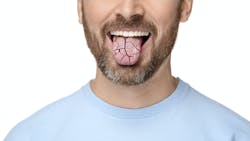Defeating dry mouth: What to know and how to help your patients
Not a day goes by that I don’t have a patient or two who's experiencing mouth dryness, or xerostomia. People who have dry mouth experience symptoms ranging from burning mouth and bad breath to tooth decay and gum disease. The more severe the dry mouth, the more uncomfortable life can become.
Many patients aren’t aware of saliva’s many jobs: it lubricates food and tissues, dilutes and clears sugars, protects tissues, clears dietary acids through swallowing, neutralizes and buffers acids, and balances the demineralization-remineralization process of teeth. It starts the digestive process, and helps stabilize, protect, and transport critical nutrients so they can be absorbed in the GI tract. Without adequate saliva, things in the mouth (and elsewhere) can fall apart quickly.
Did you know the top cause of dry mouth is medication? It’s a side effect of more than 400 of them. Other causes include smoking, not drinking enough water, mouth breathing, and systemic diseases.
The good news is there are ways you can help bring your patients back to good saliva flow and restored oral health. The first step is educating yourself so you can educate your patients.
Learn more about this common affliction and how to help your patients in my blog post, Defeat Dry Mouth
Also by Barbara Tritz:
The importance of the tongue in facial development
Dental decay and conquering cavities
Barbara Tritz, MSB, BSDATE, BRDH, is a biological dental hygienist and orofacial myofunctional therapist whose blog, Queen of Dental Hygiene, provides patients the information they need to help them on their healing journey. “Our one-hour appointment time was just not long enough to share all the many important facts I wanted our patients to learn. Dental hygiene is about so much more than just teaching brushing and flossing," says Barbara. “We are healers, educators, and lifesavers, and we need to give our patients the tools and skills to empower them to true wellness and health.”
About the Author

Barbara Tritz, MSB, BSDATE, BRDH
Barbara is a practicing biological dental hygienist at Green City Dental in Edmonds, Washington. She is the owner of Washington Oral Wellness in Kirkland, Washington, where she practices orofacial myofunctional therapy. She completed her accreditation in biological dental hygiene through the International Academy of Oral Medicine and Toxicology, and is laser certified through the Academy of Laser Dentistry. In 2019 Barbara received the HuFriedy-American Dental Hygienist Association Master Clinician Award. Barbara can be contacted at [email protected].
